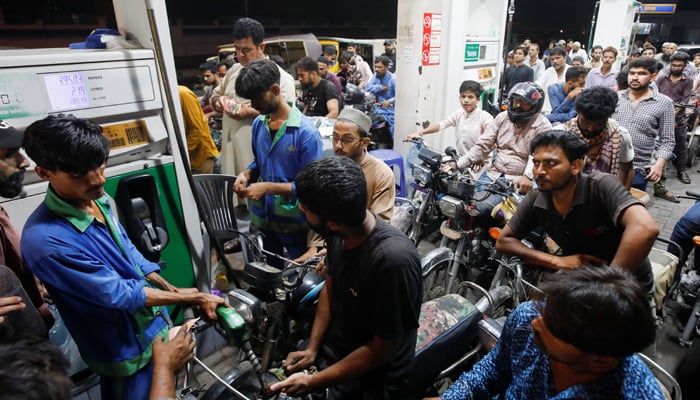Petrol price relief may soon reach inflation-hit Pakistanis as global oil prices witness a sharp decline, signalling a possible cut in domestic fuel rates from August 16. The expected petrol price reduction comes after an 11-day drop in international crude markets, offering a welcome respite to consumers struggling with high living costs.
Global Oil Prices See Sharp Fall
Market data shows a significant drop in oil benchmarks. US crude oil prices slid by $5.71 per barrel, falling from $69.26 to $63.48. Brent crude followed the same trend, dropping by $5.72 per barrel, from $71.70 to $65.98.
This sustained decline has created room for adjustments in Pakistan’s domestic petroleum prices. The government is set to review rates on August 16, with analysts predicting a notable decrease in petrol prices if the downward trend continues.
Government’s Recent Fuel Price Adjustments
In the last fortnightly review, the federal government reduced petrol prices by Rs7.54 per litre, setting the new price at Rs264.61. However, diesel saw a slight increase of Rs1.48 per litre, bringing its rate to Rs285.83.
Current fuel prices (effective from August 1) are:
-
High-Speed Diesel (HSD): Rs285.83 per litre
-
Motor Spirit (Petrol): Rs264.61 per litre
These adjustments are part of the government’s routine fortnightly mechanism, which links domestic rates to international market trends.
Read: PSX Soars to All-Time High on US Trade Deal Hopes
Parliamentary Briefing on Petroleum Levy
During the National Assembly’s Question Hour, Minister of State for Petroleum Ali Pervez Malik addressed the issue of petroleum levy and pricing policies. He revealed that on April 16 this year, the government increased the petroleum levy by Rs8 per litre on petrol and Rs7 on diesel. However, prices for consumers were not raised at that time, absorbing the additional cost.
According to the minister, the petroleum levy generated Rs34.87 billion in revenue until June 30. The government projects an estimated collection of Rs1.485 trillion from the levy in the fiscal year 2025–26, reflecting its role as a significant revenue source for the state.
Impact of Global Price Fluctuations on Pakistan
Pakistan’s fuel prices remain closely tied to movements in the global oil market. A sustained drop in crude oil rates generally benefits the domestic market by creating space for price reductions.
The recent $5-plus decline in both US crude and Brent crude prices is particularly significant, given that energy imports represent a major portion of Pakistan’s import bill. Lower global oil prices could also help reduce pressure on the country’s foreign exchange reserves and current account deficit.
Economic Relief for Consumers
For ordinary citizens, a cut in petrol prices would bring much-needed relief from inflation, which has eroded purchasing power. Transport costs have a direct impact on food and commodity prices, meaning that a petrol price reduction could have a broader effect on easing inflationary pressures.
Public transport operators, ride-hailing drivers, and logistics companies are expected to benefit immediately if the government passes on the reduction in global oil prices. In turn, lower transportation costs could help stabilise prices of essential goods in local markets.
Government’s Pricing Policy Approach
Pakistan reviews fuel prices every 15 days, adjusting rates in line with international oil trends and exchange rate movements. The government also factors in the petroleum levy, general sales tax (GST), and other margins when setting prices.
While the levy has been an important revenue stream, the government faces pressure to strike a balance between fiscal needs and public affordability. A cut in petrol prices could temporarily ease consumer burdens but may also slightly reduce the pace of levy collection if volumes do not offset the price drop.
Outlook for August 16 Review
If current global price trends persist, the August 16 review is likely to bring a notable petrol price reduction. Diesel prices could also see some adjustment, depending on the specific movement of international rates and currency exchange trends in the coming days.
Analysts caution that while the current outlook is positive, oil markets remain volatile due to geopolitical tensions, supply chain disruptions, and production decisions by OPEC+ members. Any sudden spike in prices could alter the government’s pricing decision.
Still, the present downward streak in oil markets offers Pakistan a rare window for economic relief. Consumers, businesses, and the transport sector alike are watching closely, hoping the upcoming price announcement will bring some breathing space in a year marked by persistent inflationary challenges.
Follow us on Instagram, YouTube, Facebook,, X and TikTok for latest updates
